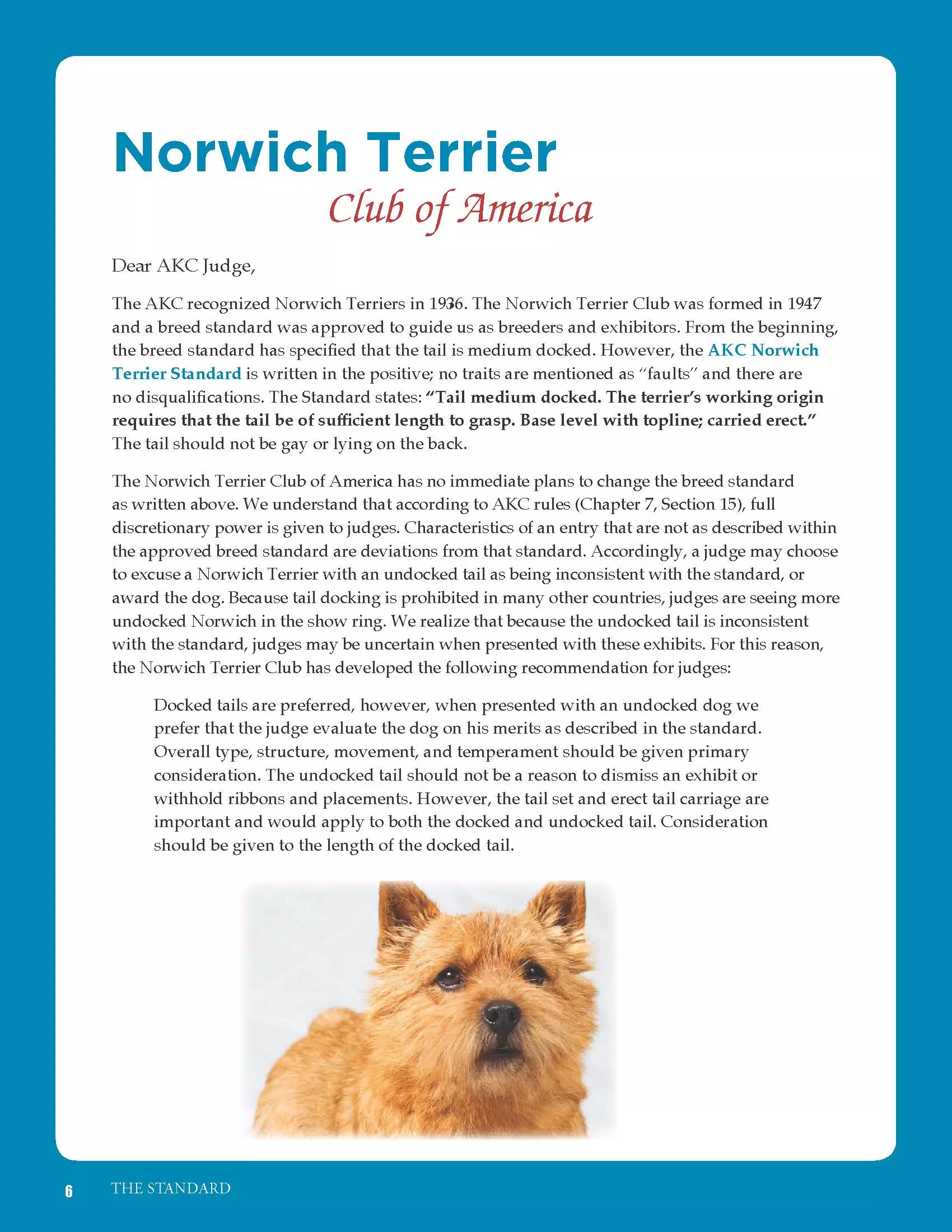Official Breed Standard for the Norwich Terrier
General Appearance
The Norwich Terrier, spirited and stocky with sensitive prick ears and a slightly foxy expression, is one of the smallest working terriers. This sturdy descendent of ratting companions, eager to dispatch small vermin alone or in a pack, has good bone and substance and an almost weatherproof coat. A hardy hunt terrier-honorable scars from fair wear and tear are acceptable.
Size, Proportion, Substance
One of the smallest of the terriers, the ideal height should not exceed 10 inches at the withers. Distance from the top of the withers to the ground and from the withers to base of tail are approximately equal. Good bone and substance. Weight approximately 12 pounds. It should be in proportion to the individual dog’s structure and balance. Fit working condition is a prime consideration.
Head
A slightly foxy expression. Eyes small, dark and oval shaped with black rims. Placed well apart with a bright and keen expression. Ears medium size and erect. Set well apart with pointed tips. Upright when alert. The skull is broad and slightly rounded with good width between the ears. The muzzle is wedge shaped and strong. Its length is about one-third less than the measurement from the occiput to the well-defined stop. The jaw is clean and strong. Nose and lip pigment black. Tight-lipped with large teeth. A scissor bite.
Neck, Topline, Body
Neck of medium length, strong and blending into well laid back shoulders. Level topline. Body moderately short. Compact and deep. Good width of chest. Well-sprung ribs and short loins. Tail medium docked. The terrier’s working origin requires that the tail be of sufficient length to grasp. Base level with topline; carried erect.
Forequarters
Well laid back shoulders. Elbows close to ribs. Short, powerful legs, as straight as is consistent with the digging terrier. Pasterns firm. Feet round with thick pads. Nails black. The feet point forward when standing or moving.
Hindquarters
Broad, strong and muscular with well-turned stifles. Hocks low set and straight when viewed from the rear. Feet as in front.
Coat
Hard, wiry and straight, lying close to the body with a definite undercoat. The coat on neck and shoulders forms a protective mane. The hair on head, ears and muzzle, except for slight eyebrows and whiskers, is short and smooth. This breed should be shown with as natural a coat as possible. A minimum of tidying is permissible but shaping should be heavily penalized.
Color
All shades of red, wheaten, black and tan or grizzle. White marks are not desirable.
Gait
The legs moving parallel, extending forward, showing great powers of propulsion. Good rear angulation with a true, yet driving movement. The forelegs move freely with feet and elbows the same distance apart, converging slightly with increased pace. Hind legs follow in the track of the forelegs, flexing well at the stifle and hock. The topline remains level.
Temperament
Gay, fearless, loyal and affectionate. Adaptable and sporting, they make ideal companions.
Approved October 13, 1981
Reformatted March 23, 1990
The Illustrated Guide to the Standard of Norwich Terriers can be downloaded HERE. A print copy may be purchased from the NORWICH STORE.

The Illustrated Guide to the Standard of Norwich Terriers can be downloaded HERE. A print copy may be purchased from the NORWICH STORE.

The NTCA’s recommendation for judging a Norwich Terrier with an undocked tail was published in the “The Standard: The AKC Newsletter for Conformation Judges” Spring 2015. The judges directive concerning the undocked tail can be downloaded HERE .

